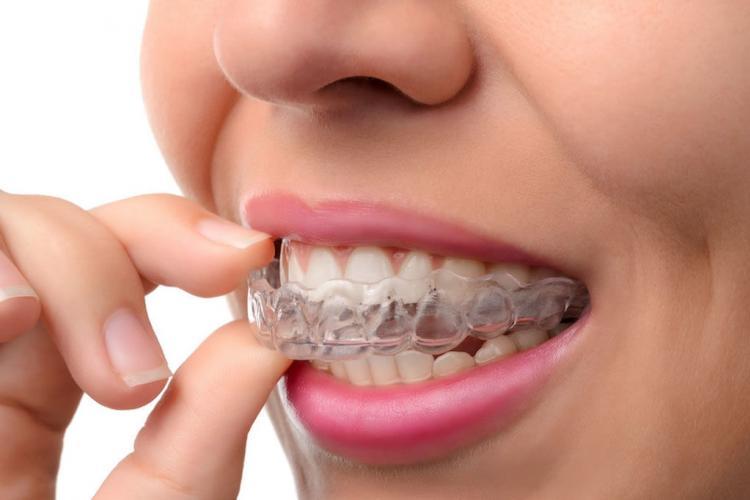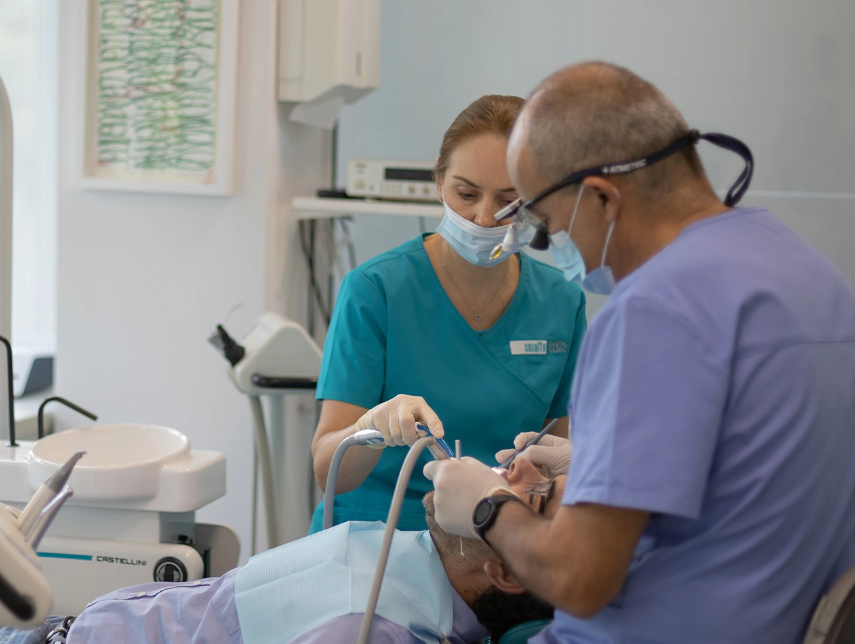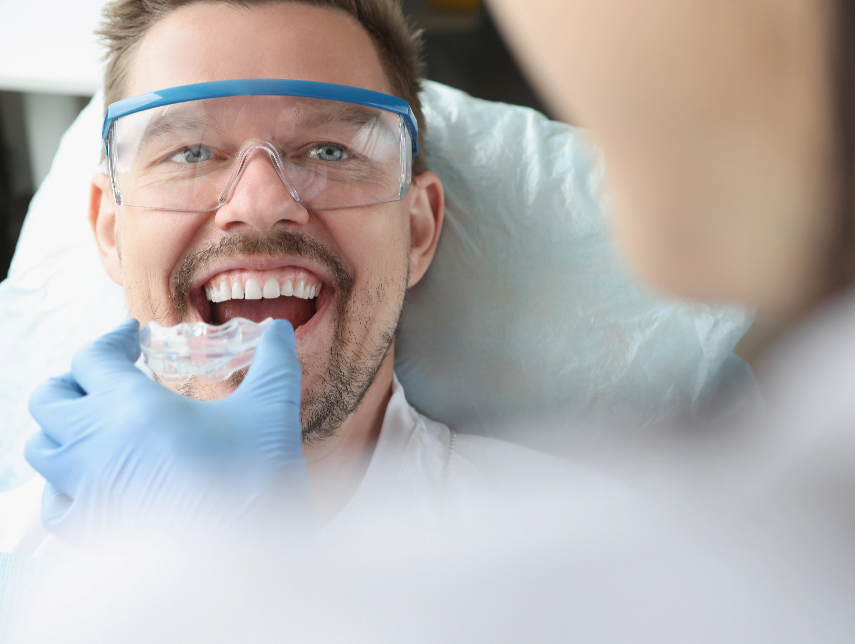Home / Dental Treatments / Bruxism
Bruxism
Does your partner complain about you grinding your teeth or clenching your jaw at night?
This dental condition is called bruxism and is common to adults and children. Many jaw clenchers are likely to do so during the day too, usually as a reaction to stress. For others, bruxism may occur in silence, leaving them completely unaware of their condition.
When bruxism exists for a long time, you will soon experience tooth wear, sensitivity and decay. Don’t wait until bruxism destroys your teeth and affects your overall oral health!
Smalto Dental Clinic in Nicosia has an experienced team of dentists specialized in bruxism detection, assessment and treatment. Call our clinic today to discuss how we can help you protect your teeth by treating bruxism fast and efficiently!

Call us today and take the first step to a
healthier, more beautiful smile!

Gnashing or bruxism is the dental term for the involuntary clenching of teeth, accompanied by dynamic lateral movements of the jaw. Teeth grinding disorders can occur both during the day and during sleep at night.
Under normal conditions, mastication muscles keep the upper jaw at a distance from the lower jaw, except during the mastication/chewing of food. All other hours of the day the mouth should be in a “resting position,” so that the upper teeth do not touch the lower teeth.
Bruxism is a parafunction, where most patients are unaware that they are grinders, even when the tooth attrition is intense. In fact, when tooth clenching is not accompanied by symptoms such as headache, sore or aching jaw muscles and teeth chipping, the patient often finds it hard to believe they are doing it.
Most patients are persuaded to address the problem by their partners who hear them grind their teeth during the night.


The causes of bruxism are still unknown, but it is generally related to:
In children, sleep bruxism may be a response to pain manifesting in some other area of the body (e.g., earache). It can also manifest as a reaction to severe stress and psychological pressure, just like in adults.
Since bruxism is largely unconscious and related to stress, it is recommended that the patient tends to the underlying cause of their anxiety. Stress-relieving exercises, relaxation, and habit-breaking techniques may help to manage the symptoms.
Apart from behavioral therapy, night-time bruxism can be managed using mouth guards or mouth splints. These protective splints or guards made of tough acrylic material, are placed on the upper or lower teeth.
Proper construction and application of the splint make it easier for the patient to follow the treatment. Splints do not cure bruxism, but they help patients deal with its effects, protecting the teeth from attrition.


A mouth splint for bruxism, also known as an occlusal splint or a nightguard, is a custom-made device that fits over the teeth to protect them from grinding or clenching. Mouth splints are made of soft material that patients feel comfortable wearing at night. Their construction is easy and, therefore, less costly.
How do mouth splints for bruxism work?
The application period of mouth splints for bruxism can last from a few weeks to many months. Usually, after the first few applications, the splint is well-tolerated.
In many cases, tooth wear progresses without the patient noticing due to a lack of symptoms. This leads to a particularly unaesthetic and functional problem. In these cases, it is usually necessary to reconstruct the vertical dimension of occlusion with occlusal bridges and crowns.
If you are suffering from bruxism, book an appointment with a Smalto Dental Clinic dentist who will create a treatment plan tailored to your needs.

There is no set timeline for curing bruxism, as treatment will depend on the underlying causes and severity of the condition. With proper treatment and management, however, most people are able to reduce or eliminate symptoms of bruxism over time.
Yes, bruxism can be stopped or managed with various treatment options, such as mouthguards or splints, stress management techniques, or addressing underlying medical or dental issues.
However, there is no one-size-fits-all solution for bruxism, as treatment will depend on the individual case and underlying causes.
It’s important to speak to your trusted local dentist to determine the best course of action for your specific situation.
Call the team of expert dentists at Smalto Dental Clinic who are able to tell you all about bruxism.
A dentist can diagnose bruxism by examining the teeth for signs of wear or damage and asking about symptoms.
Bruxism may be a lifelong condition, especially if it is caused by a structural issue such as misaligned teeth.
However, with proper treatment and management, most people are able to reduce or eliminate symptoms of bruxism over time.
Additionally, addressing underlying causes such as stress and anxiety can help prevent future episodes of teeth grinding or clenching.
Good oral hygiene, avoiding excessive alcohol or caffeine, and reducing stress can all help prevent bruxism. It’s also important to seek treatment for any underlying medical or dental issues that may be contributing to the condition.
The guidelines for bruxism focus on prevention, diagnosis, and treatment of the condition. Here are some key points:
Following these guidelines can help prevent and manage the symptoms of bruxism, leading to improved dental and overall health.
An interesting fact about bruxism is that it can occur during sleep or while awake. Awake bruxism is often associated with stress, anxiety, or tension, while sleep bruxism is thought to be related to sleep disorders such as sleep apnea.
Additionally, studies have shown that people with certain personality traits, such as competitive, aggressive, or hyperactive tendencies, may be more prone to bruxism.
Bruxism is also more common in children, and they are more likely to outgrow the condition as they age.
Overall, while bruxism can be a challenging condition to manage, understanding the factors that contribute to it can help develop effective treatment plans.
Stress and anxiety, caffeine and alcohol consumption, certain medications such as antidepressants, and medical conditions such as sleep apnea can make bruxism worse.
Additionally, habits such as chewing on non-food objects, such as pens or pencils, or clenching the jaw during exercise can exacerbate symptoms of bruxism.
Poor sleep hygiene, such as irregular sleep patterns or not getting enough sleep, can also contribute to the development or worsening of bruxism.
Identifying and addressing these factors, and seeking appropriate treatment, can help manage and reduce symptoms of bruxism.